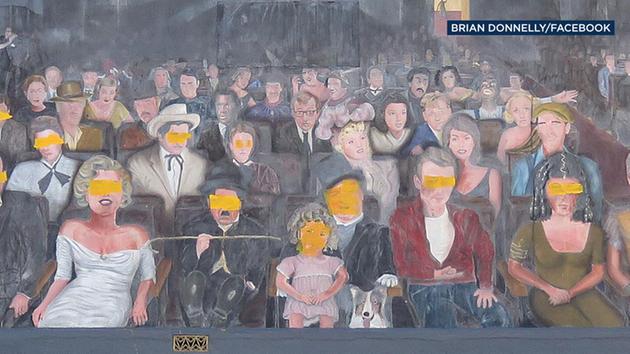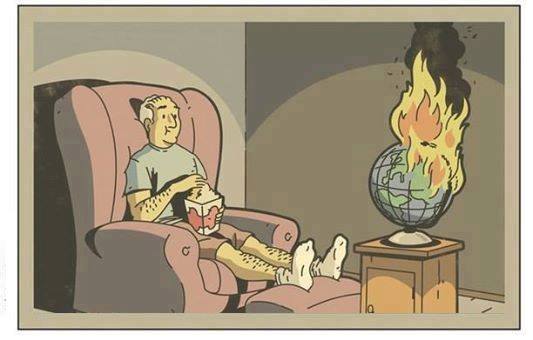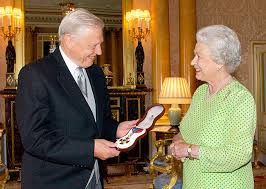
“We are all in the gutter, but some of us are looking at the stars.”
― Oscar Wilde
The Idiocy of Celebrity & The Celebration 0f Idiocy
The celebrity is the role model broadcast non-stop advertising the positive value of total identification with modern alienation.
The usual interpretation of the above quote from Oscar Wilde is that although all of us are miserable, some of us are looking for ways out of our misery. Unfortunately, in this society, seeking a way out of the gutter is more often than not seeking to become a star, the model aspiration hierarchical society seduces people with as an exit to fortune. “When it is dark enough, you can see the stars” (Emerson) and at 2 minutes to the midnight of the planet, life is getting darker and darker whilst the stars seem brighter and brighter. At the bottom of the hierarchy the only serious way of seeking a way out of the gutter of isolation and humiliation, the only serious way to reach for the stars, is to bring the heavens down to earth and overturn this gutted life by mass struggle. And that involves opposing the false individualist “solution” waved like a carrot in front of everyone’s eyes – the carrot of “fame” which invariably makes even those who reach stardom at best comfortable and complacent towards their unhappiness.
“Behind the glitter of spectacular distractions, a tendency toward banalization dominates modern society the world over, even where the more advanced forms of commodity consumption have seemingly multiplied the variety of roles and objects to choose from….Complacent acceptance of the status quo may also coexist with purely spectacular rebelliousness — dissatisfaction itself becomes a commodity as soon as the economy of abundance develops the capacity to process that particular raw material.
Stars — spectacular representations of living human beings — project this general banality into images of permitted roles. As specialists of apparent life, stars serve as superficial objects that people can identify with in order to compensate for the fragmented productive specializations that they actually live. The function of these celebrities is to act out various lifestyles or sociopolitical viewpoints in a full, totally free manner. They embody the inaccessible results of social labor by dramatizing the by-products of that labor which are magically projected above it as its ultimate goals: power and vacations — the decision-making and consumption that are at the beginning and the end of a process that is never questioned. On one hand, a governmental power may personalize itself as a pseudo-star; on the other, a star of consumption may campaign for recognition as a pseudo-power over life. But the activities of these stars are not really free and they offer no real choices.
The agent of the spectacle who is put on stage as a star is the opposite of an individual; he is as clearly the enemy of his own individuality as of the individuality of others. Entering the spectacle as a model to be identified with, he renounces all autonomous qualities in order to identify himself with the general law of obedience to the flow of things. The stars of consumption, though outwardly representing different personality types, show each of these types enjoying equal access to, and deriving equal happiness from, the entire realm of consumption. The stars of decision-making must possess the full range of admired human qualities: official differences between them are thus canceled out by the official similarity implied by their supposed excellence in every field of endeavor. As head of state, Khrushchev retrospectively became a general so as to take credit for the victory of the battle of Kursk twenty years after it happened. And Kennedy survived as an orator to the point of delivering his own funeral oration, since Theodore Sorensen continued to write speeches for his successor in the same style that had contributed so much toward the dead man’s public persona. The admirable people who personify the system are well known for not being what they seem; they attain greatness by stooping below the reality of the most insignificant individual life, and everyone knows it.” – from Society of the Spectacle (thesis 59, 60 & 61).
*******************************
An excerpt from this:
” The connection between the repression of the masses of individuals and their attraction to celebrities reminds us of what Wilhelm Reich observed in his analysis of fascism and Hitler’s “charisma”: what individuals repress in themselves, and/or are forced to repress, gets channelled into a delirious admiration for celebrities who are the specialised external ‘expression’ of these repressed qualities (Reich’s limitation in his analysis was to reduce repression to sexuality, when what is repressed is not just the body and the capacity for direct love between individuals but also critical intellect and practical subversive social opposition, all of which dialectically interact with one another). Nowadays, though there are still fanatical fans, most people, in keeping with the resigned cynicism of the times, who have an unenthusiastic, take it or leave it, attitude to famous people, expressing an indifference also to what is repressed in themselves, especially class anger.”
“Fame Is A Mask That Eats Away The Face
The desperation of fame and those who admire and seek it
The cliché of the lonely entertainer, unhappy clown etc. is grounded in a certain truth; the attention and, often, adoration, an audience gives to the performer is close to the unconditional love of a mother to her child*. (This is reflected in the obsessive behaviour of some ‘fans’- i.e. fanatics.) Yet, unlike a mother, it is a strangely impersonal love, as shared by thousands or millions. And it can easily be tranferred to the next trend to come along, so the star must compete for attention with all the others clamouring for exposure in the media marketplace. (If one lasts long enough to be granted ‘legendary’ status, a reputation based on long past activities – then one is frozen in time with the millstone of a past that all present activity is compared to.) So fame inevitably tends to breed insecurity. Like a ‘beautiful’ woman who inspires interest on the basis of an impersonal, objective fact – her appearance – the celebrity can’t be sure if the crowd loves the real them or merely their performance, their appearances. To compensate for this confusion (and add to it), the star sometimes loses the distinction and comes to see their whole existence as a public performance. S/he lives only through the maintenance of a public image – life mediated by the media. In extreme cases this alienation from one’s self becomes chronically self-destructive and the celebrity falls apart in public; the vultures of the Media gleefully record the crack up, as if to say; ‘we put you up there and we’ll exploit the performance of your downfall.’. Meanwhile, the fans think they are ever so autonomous by by-passing the media, devoting websites to the ins and outs of their idol’s problems (Pete Doherty in 2005 is only the latest in a long line of stars going through this process – but what the hell, it sells records and keeps him famous – that’s why he got into that business). The early 70’s movie ‘Stardust’ was more honest than most about the alienation of the rock star celebrity, but then this was in an era when all roles were being questioned, and the movie was a recuperation of a more profound critique.
The decomposition of this stupid life is given a boost in the way the fan wishes they could be the decomposed idol of their choice. Fame being the image of power and glory, the fan strives for this power vicariously, one step removed. The decadence of the celebrity and their decomposing contradictions within the intensified collapse of this world becomes a projection and valorisation of the petty misery the fan endures. It all makes misery seem glamorous, an aestheticisation as ‘tragedy’: “even if I’m fucked up I can become a star, and maybe even use my fuck-ups to become a star, or an artist of some kind. Poets always suffer for their art”. Criticism remains confined to thinking of ways to improve the star but the fundamental hierarchical respect for the star as living commodity is not criticised. This modern dialectic of pseudo-‘criticism’ – and real identification – is expressed in the transformation in the fan from frenzied adoration to a partial detachment – the more ‘sophisticated’ fan. Take the fairly recent French no. 1 hit whose most famous line is “If I exist, it’s to be a fan, to be a fan, to be a fan” repeated endlessly in almost operatic style, obviously implying a partial contempt for the fan (partial because obviously the singer can’t go so far as to totally bite off the hand that feeds him). The guy who wrote and performs it was at one time an obsessive fan. He’s turned his lucidity about himself into another reason to perpetuate the star system, but this time with an apparent ‘knowing’ superiority, having risen from spectator to ‘spectacle’, from fan to star. At the same time, ‘criticism’ here expresses the fact that the fan, if s/he is to be really cool, must no longer be absolutely unsubtly abject, but must take his spectacle with a pinch of salt. Only that way can s/he have the possibility of not being simply a contemptible fan, but also maybe an innovator, maybe even making money out of it.” – from: “Some Musical Notes”
****************************************
On John Lennon, following his assassination
“In our capitalist society, as in any society, people are brought together by the common essence of their species [1]. Under capital however, what is immediately experienced is not this common essence but all the things that separate people. So although the qualities of the common essence are experienced as real they pertain to something other than humanity. They are projected onto a super being. In the past this was god. Nowadays it’s a star, a person as distant as the sun yet as close as your ear. When Lennon pointed out that the Beatles were more popular than Jesus he was just stating the obvious.
Part of the spectacle is the decisive modernization of religion. Gone are all the local gods and unitary myths and in their stead strides a global power and a general alienation. What is permitted is so much less than what is possible. The spectacle is religion made banal and banality made sacred. Its creed is the price-tag, its hymns are cultural and its cathedral is urbanism.
In the past, people wept at the death of gods and kings because their passing brought changes that affected everyone. Nowadays they bemoan the death of the man behind the image. When you buy a record you not only buy a recording of someone but you also buy the way they choose to represent themselves to you. The fan needs to know that there’s a real person behind the commodity. A human who guarantees the authenticity of the product; a person to make credible the incredible, to make public their privacy, to dominate your life in the guise of revealing theirs’. But once the reality has been rubbed out all you’re left with are the bare objects, the records and books and posters. Not that this sudden unmasking puts anybody off. Oh no, nostalgia jumps in to take the place of authenticity. An instant swap. And record sales leap. In the topsy-turvy world of the spectacle, to die is to live again.
All those who reckoned that Lennon’s death was almost as shocking as Kennedy’s erred on the side of caution. It was more so. Precisely because it was less expected. Because it was unprecedented. Americans have been looking forward to the assassination of another Kennedy for years. No one expected the murder of a Beatle. Yet in this anaesthetised society the unexpected is necessary. It’s the trigger that fires the emotions. Political killing is too tame; the people need a stronger dish.
…Previously, rock stars burnt themselves out in a blaze of drugs and sex and wild living. This gave spectators a choice of reactions. From vicarious appreciation through imitation to moral condemnation. In Lennon’s case the reaction was unanimous. Despite everything the star comes across as vulnerable, as a victim. Just like you and me.
In our society the sudden demise of a man of fame and money, the one in a million with the chance to really live, to survive without working and have anything they desire (or so it appears) is seen as a tragic waste. Yet isn’t it galling to think that people who habitually write off so much of their time and potential as a loss and do nothing about it should recognize the loss of something they barely knew was happening: the colonisation of their minds and desires by a culture built on commodities. In the deathly hush that follows the rise of capital, its dominion over our daily lives and its animosity to any real form of community one point is clear: the greater the silence the more records sold. The news of Lennon’s death dominated the media completely. In the gaze of the news machines the mundane becomes portentous and the human banal. The victim signs an album cover – it becomes his “death warrant”. His last words were poignant – they made them into headlines [4]. Soon after the shooting television stations reshuffled their programmes to screen tributes and archival footage. They had a captive audience -and viewers had a good excuse to stay glued to their sets. The media people realize that an idol’s death is positively their last chance to project his image. Indeed the heat of the competition to interpret his career should have stimulated their imaginations. Instead, because they understood so little, they had nothing to say. Caught with their pants down, the best they could do was to fart banalities.
…It is obvious that the Lennon phenomenon is a very remarkable one. His unholy alliances with the music business did succeed in creating legions of fans who never knew him personally yet who felt his death intimately. Not, after all, such a common experience.
…The experience of public adoration and public hatred gave Lennon a partial critique of pop stardom: “One had to completely humiliate oneself to be what the Beatles were, and that’s what I resent. I didn’t know, I didn’t forsee. It happened bit by bit, gradually, until this complete craziness is surrounding you, and you’re doing exactly what you don’t want to do with people you can’t stand – the people you hated when you were ten.” Lennon had tried to use the spectacle to communicate his ideas but only succeeded in getting his fingers burnt. What he and the thought of the times had in common was that they were critical of society without being critical enough. No one can understand the society of the spectacle unless they are determined to fight it.
…Lennon was more than just another star. He was an ultra superstar. Most stars settle for being super, the ultra wants to be human again. Since being a star necessarily means that people don’t believe in you, can’t take you completely literally, know that you’re an image and an actor, they manage to maintain a certain crucial distance. In most cases this distance is vital because without it the whole imposture would stand revealed. Only the ultra dares to try and bridge this gap. After years of hard slog Lennon managed to carve out a free space for himself. Only to find that this real freedom confirmed his separation from the rest of our unfree society. His hotel was another prison. From it he aspired to full credibility. He wanted to communicate, to make friends, but all he could do was to propagate strangers.”
– from “death of the walrus”.
**********************************************
On David Attenborough
“The creation of an artificial language that shapes rather than reflects reality, is greatly aided by the fact that nature is increasingly experienced as a media representation, one we are guided through by professional presenters and ‘unworldly’ falsifiers like David Attenborough as if they alone know the path to nature’s holy grail, a nature unspoiled by the devastation wrought by capitalism. Sir David has now acquired the status of a national treasure. Revered to the point of worship even by the likes of Johnny Rotten, to be even mildly critical of this nature royal is to be guilty of the crime of lese-majesté. As the nature illusionist, he has rightly incurred the censure of George Monbiot but who then typically retracts and praises the man – however in a way that totally damns Sir David, once the connotation of his remark are properly understood and whose true meaning obviously escapes Monbiot. Godlike in that St David can do no wrong “in the eyes of all who worship him” he is godlike in another sense in that “he has created a world which did not exist before”.
A comment like this could have rolled off the pen of a Schelling or even the far harder-headed Hegel. Dialectical idealism aside, also present in this categorical statement is the romantic dream of ultimate artistry, the desire to create life and replace “god”. Translated into today’s environment it amounts to saying that without Sir David nature does not exist and, what’s more, can only do so in the presence of celebrity, for this is now its conditio sine qua non. Forget cameramen and women, production teams, production editors, operations managers and what not, (actually all irrelevant save the former), this is more than just the appropriation of other peoples efforts typical of captains of industry or those erstwhile “masters of the universe”, the financiers. No longer just a knight of the realm, Sir David has now become a demi-urge that creates the universe we are in! Every bubble is more an outrage against common sense, more of an anti-gravity event than the last, so now is the time to float the possibility of a nature bubble, a Planet Earth become an ark of re-engineered nature.
In order to retain their credibility, nature celebrities like Attenborough have begun to pepper their broadcasts with calls for action as though they were saying something shockingly radical, the incantatory effect of this word sweeping all before it like magic. But really it is a call for more talks at the political level, for talks about talks until the incendiary word has been robbed of all meaning by talktalk. Action as envisaged by Sir David is inaction, a motionless form of motion, an impotent declamation on the stage of world politics such as the December 2009 Copenhagen Conference on climate change will undoubtedly turn out to be and which more perceptive, though hardly radical, commentators already acknowledge to be the case (see, for instance the Guardian 29/9/09 “The last chance to save the world: long, contradictory and impenetrable”) The last thing Sir David wants is for people to take matters into their own hands and act for themselves. This is the only way to save nature and is also rapidly bound to reconnect with a past which has been smothered in forgetfulness and drowned in calumny when people did take to the streets and could make a difference.
In the interim, as never before, celebrity became a displaced praxis, an alienated form of empowerment based on the renunciation of self and a symptom of increased dispossession such that nothing is achievable without the presence of celebrity. So omnipresent is the infatuation with celebrity that not so long ago Butterfly Conservation organised butterfly walks along the south coast of England with each step of the way guided by a different celebrity! By virtue of being a celebrity they knew everything about butterflies and gave life to them. So much for the little things that run the earth. Without a parasitic superstructure it seems they can’t! Today there is nothing a celebrity can’t fix from curing world poverty, negotiating with the Taliban, sorting out the Middle East to finding a cure for cancer. Their collective, gargantuan, though self-serving aims, reminds one of the hopes that formerly were invested, for much sounder reasons, in the workers and non-workers’ movement. And ultimately it all boils down to money, the need to justify it, even appearing to give it away (“we owe it to humanity”) in order to double up on income later, once the media publicity has done its work by keeping a celebrities name in circulation. And that is why Sir David Rottenborough has to predate the word “action” and render it extinct through over kill. His unspoilt, not of this world, vision of nature he seeks to project is ultimately directed to preserving the status quo, to conserving the money economy and a dreamlike nature rather than a down and dirty nature for an anonymous majority that has temporarily lost sight of itself, the worship of celebrity a major part of this self-denying ordinance. And only in so far as the eco-constituency is prepared to transgress, and not do as it’s told, will it begin to understand this and act upon it.”

***********
On Nelson Mandela
“A 95 year old multimillionaire dies peacefully and the ruling world treats him as an endearing demi-god because he spent 28% of his life in prison under a vile fascistic form of government and on his release became an international political star. Did the world’s most well-known shitheads turn up for the 34 killed at Marikana, who never even had the option of the misery of prison? Do people even know their names? Have they heard of Teboho Mkhonza, Michael Makhabane, Marcel King and all the others killed by the ANC cops in peaceful demonstrations before Marikana? No – because these unknowns never had any mystical aura fabricated for them that could possibly wash off on the powerful scum hoping to bathe in Mandela’s reflected glory….We are everywhere encouraged to forget history in order to gaze admiringly on “the giant of history”, the man who, apparently, ended apartheid and improved the lot of millions of blacks. “History” is for the “Great”, not for nothings like you and me….The spectacle is, as ever, the rulers’ most insidious stun grenade, making everyone see stars as they fall into unconsciousness…Because the spectators remain above all external to history, they feel the need, particularly when the conflicts of present society have hit them directly, for their gestures of “opposition” to be embodied in mythological heroes, like St. Nelson, who represent history for them. Christ used to be essential to the Christian mentality because he is the subjective incarnation connecting Earth with heaven; he is the external being who makes the Christian mentality possible because it is the Earth that constitutes for Christianity the actual inaccessible heaven….For the ordinary submissive mentality “revolutionary” heroes like Mandela literally perform the function of Christ, and you don’t need to be a Christian to have a Christian mentality, to be hypnotised by the forces relentlessly promoting such an icon. The romantic vision of a “Giant of History” carries out, through the sacred person of the hero, the union of terrestrial triviality with the heaven of universal history. ” – from “mandela can go to hell!”
UK: celebrities do something useful
Footnotes
*In fact, this could equally be reversed: the fan adores the celebrity like a child loves their mother- it’s a symbiotic relationship and who gives birth to whom is largely irrelevant – both depend on each other.
1] This is a pretty dubious abstraction and doesn’t really mean anything. In fact, what brings people together are common interests, needs and desires: whether these interests, needs and desires are imposed hierarchically and/or haphazardly or are consciously chosen (within a world that has not been chosen, of course) is the more essential question when looking at any particular situation.





Leave a Reply